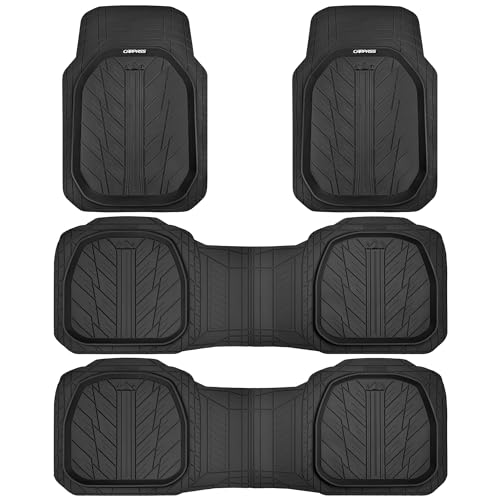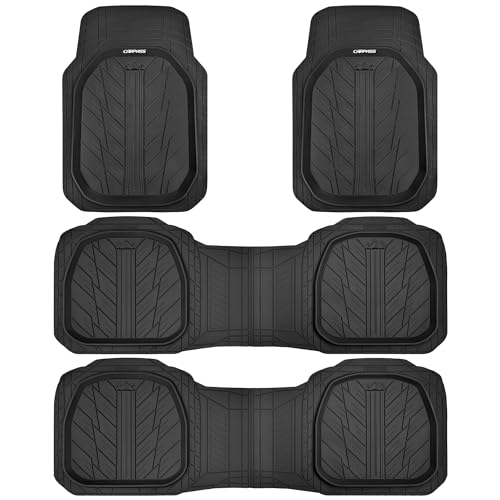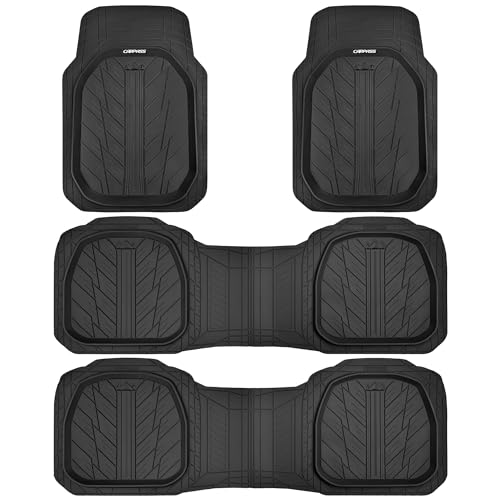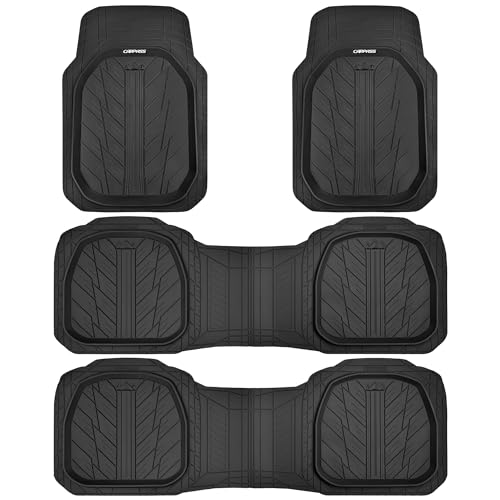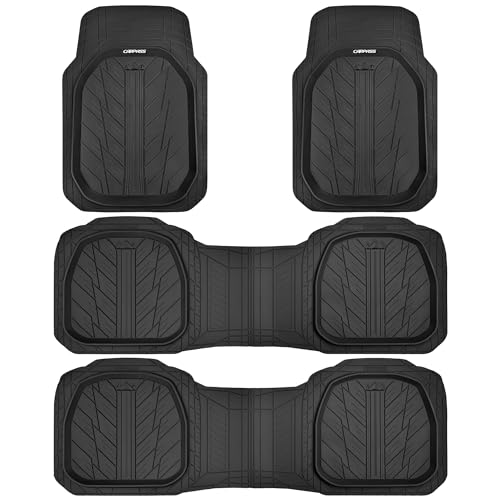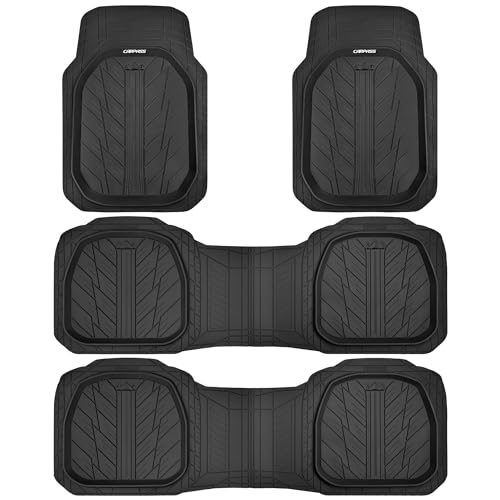The choice between trucks and SUVs has always been a contentious topic among automotive enthusiasts. With over 2 million trucks sold in the U.S. alone in 2022, their popularity is undeniable. But is the rugged appeal of a truck truly what consumers need compared to the versatility of an SUV?
Trucks have a rich history, originally designed for heavy-duty tasks and hauling. Meanwhile, the SUV, which evolved from the station wagon, combines comfort with an off-road capability. For instance, recent data shows that SUVs make up nearly 40% of all vehicles sold in the U.S., signaling a consumer preference for adaptability and family-friendly design.
| Feature | Truck | SUV |
|---|---|---|
| Towing Capacity | High towing capacity | Moderate towing capacity |
| Interior Space | Smaller cabin, large cargo bed | Spacious cabin, ample cargo space |
| Fuel Efficiency | Lower fuel efficiency | Better fuel efficiency |
| Off-road Capability | Excellent off-road performance | Good off-road capability |
| Seating Capacity | Up to 5 passengers | Up to 7-8 passengers |

Overview of Trucks and SUVs
Trucks and SUVs are two popular types of vehicles, each with unique features. Trucks are known for their power and ability to carry heavy loads. SUVs, on the other hand, are valued for their spaciousness and versatility.
Overview of Trucks
Trucks were originally designed for work and heavy-duty tasks. They are often used on farms and construction sites. With their powerful engines, trucks can tow large trailers and haul heavy loads.
Many people choose trucks for their durability. They have strong frames and can handle rough conditions. This makes them a favorite for those who need a reliable and tough vehicle.
Modern trucks have become more comfortable. They now come with features like leather seats and advanced technology. This makes them appealing not just for work but also for everyday use.
Trucks come in different sizes. There are small trucks for lighter tasks and big trucks for heavy-duty work. This variety allows people to choose the right truck for their needs.
In recent years, trucks have also become more fuel-efficient. They now offer better gas mileage, making them more practical for daily driving. This has widened their appeal beyond just work settings.
Overview of SUVs
SUVs, short for Sport Utility Vehicles, are known for their versatility. They offer a good balance between comfort and capability. Many families prefer SUVs for their spacious interiors.
SUVs are perfect for road trips and family outings. They have ample cargo space for luggage and other items. This makes them a popular choice for those who love to travel.
These vehicles often come with advanced safety features. Many SUVs include things like blind-spot monitoring and rearview cameras. This adds to their appeal, especially for families.
SUVs are also designed for both city and off-road driving. They have higher ground clearance, making them suitable for various terrains. This versatility is a big plus for adventurous drivers.
Lastly, SUVs come in different sizes and styles. Whether you need a compact SUV for city driving or a large one for big families, there’s an option for everyone. This makes them a flexible choice for many people.
Key Features Compared
Trucks and SUVs have unique features that set them apart. Understanding these features can help you choose the right vehicle for your needs. Let’s compare some of the key features of trucks and SUVs.
Power and Performance
Trucks are known for their powerful engines. They can tow heavy trailers and haul big loads. This makes them perfect for work and heavy-duty tasks.
SUVs also have strong engines, but they focus more on balance. They provide enough power for good performance, but also prioritize smooth driving. This makes them ideal for family trips and daily commutes.
Many trucks come with four-wheel drive. This feature helps them navigate rough and uneven terrain easily. It’s a great choice for people who need to drive in off-road conditions.
SUVs also offer four-wheel drive options. Though not as rugged, it provides excellent traction for both city and mild off-road driving. This makes SUVs versatile and safe in different road conditions.
When it comes to fuel efficiency, SUVs generally perform better. Modern SUVs are designed to be more efficient, saving you money on gas. Trucks have improved, but they often consume more fuel due to their size and power.
Interior Space and Comfort
SUVs are known for their spacious interiors. They often have three rows of seats and ample cargo space. This makes them ideal for families and long trips.
Trucks also offer comfort but are designed differently. They usually have two rows of seats and a large cargo bed outside. This setup is great for carrying tools, equipment, and materials.
SUVs often come with advanced comfort features. These include heated seats, climate control, and high-end audio systems. Such features make long drives more enjoyable.
Modern trucks have enhanced their interiors too. Many now feature leather seating, infotainment systems, and advanced safety features. These additions make trucks comfortable for both work and leisure.
The seating position in SUVs is usually higher. This gives drivers a better view of the road. Trucks also offer a high seating position, but the focus remains on cargo and towing capacity.
Towing and Hauling
Trucks are unmatched in towing and hauling capabilities. They can tow boats, trailers, and even small homes. This makes them essential for work and heavy-duty use.
SUVs can tow too, but to a lesser extent. They are great for towing smaller trailers and boats. This makes them versatile for both family outings and light work tasks.
Trucks often come with specialized features for towing. These include trailer sway control and integrated brake controllers. Such features make towing safer and easier.
SUVs also offer towing assistance features. These include rearview cameras and parking sensors. While not as specialized as trucks, these features are still very helpful.
The cargo bed in trucks is a big advantage. It allows for easy loading and unloading of large items. SUVs typically lack this feature but make up for it with enclosed cargo space.
Safety Features
SUVs often come packed with advanced safety features. These can include lane departure warnings, blind-spot monitoring, and adaptive cruise control. Such features make them a top choice for families.
Trucks also offer a range of safety features. Newer models are equipped with modern safety technologies such as forward collision warning and automatic emergency braking. This improves their overall safety on the road.
SUVs have a higher safety rating for passenger protection. Their design focuses on keeping occupants safe during a collision. This adds to their appeal, especially for parents.
Truck designs are evolving to improve safety. Stronger frames and better crumple zones are now common. These enhancements make them safer than older models.
Both trucks and SUVs usually come with multiple airbags. These include front, side, and curtain airbags. Such comprehensive safety setups provide peace of mind.
Cost and Affordability
Trucks generally have a higher starting price. This is due to their size, power, and capability. However, they can be cost-effective for those who need their strong features.
SUVs offer a range of prices. There are affordable options for budget-conscious buyers and luxury models for those seeking premium features. This wide price range provides more choices.
Maintenance costs for trucks can be higher. Their specialized parts and robust build require regular upkeep. However, their durability often means they last longer.
SUVs typically have lower maintenance costs. Their design focuses on family use and everyday driving, which tends to cause less wear and tear. This makes them a more economical choice for routine use.
Fuel costs are another important factor. As mentioned earlier, SUVs usually offer better fuel efficiency. This can save you money in the long run, especially if you drive a lot.
Trucks vs SUVs: Feature Comparison
Trucks and SUVs offer different features to meet varied needs. Understanding these features can help you make an informed decision. The table below compares some of the key features of trucks vs SUVs.
| Feature | Truck | SUV |
|---|---|---|
| Towing Capacity | High towing capacity | Moderate towing capacity |
| Interior Space | Smaller cabin, large cargo bed | Spacious cabin, ample cargo space |
| Fuel Efficiency | Lower fuel efficiency | Better fuel efficiency |
| Off-road Capability | Excellent off-road performance | Good off-road capability |
| Comfort Features | Basic comfort features, with upgrades available | Advanced comfort features |
| Safety Features | Basic safety features, improving with newer models | Advanced safety features |
| Cargo Space | Large external cargo bed | Enclosed cargo space |
| Price Range | Higher starting price | Wide price range |
| Usage | Work and heavy-duty tasks | Family and daily driving |
| Seating Capacity | Up to 5 passengers | Up to 7-8 passengers |

The Good and The Bad
Choosing between trucks and SUVs involves weighing their pros and cons. Each vehicle type has its own benefits and drawbacks. The table below highlights the good and the bad of trucks vs SUVs.
| Pros | Cons |
|---|---|
| High towing capacity (Truck) | Lower fuel efficiency (Truck) |
| Spacious cabin (SUV) | Moderate towing capacity (SUV) |
| Excellent off-road performance (Truck) | Higher starting price (Truck) |
| Better fuel efficiency (SUV) | Less cargo space (SUV) |
| Advanced safety features (SUV) | Basic safety features (Truck) |
Price Comparison
When deciding between a truck and an SUV, price is an important factor. The costs can vary based on features, brand, and size. The table below compares the price ranges for trucks and SUVs.
| Truck | SUV |
|---|---|
| Higher starting price | Wide price range |
| More expensive for heavy-duty models | More affordable options available |
| Higher maintenance costs | Lower maintenance costs |
| Higher fuel costs | Lower fuel costs |
| Expensive specialized parts | Economical routine maintenance |
Which Is Better?
Deciding between a truck and an SUV depends on your specific needs and lifestyle. Trucks are ideal for those who need to carry heavy loads and tow large items. They are perfect for work and outdoor adventures.
SUVs, on the other hand, are great for families. They offer ample space, advanced safety features, and better fuel efficiency. SUVs are versatile and can handle both city and off-road driving.
If you value durability and power, a truck might be the better option. However, if comfort, safety, and fuel efficiency are more important to you, an SUV is likely the better choice. It really depends on what you prioritize in a vehicle.
Here are three reasons why an SUV might be the final winner:
- **Comfort and Space:** SUVs offer more passenger space and comfort features.
- **Fuel Efficiency:** SUVs are generally more fuel-efficient, saving you money on gas.
- **Safety Features:** SUVs often come with advanced safety technologies, making them ideal for families.
Frequently Asked Questions
Choosing between a truck and an SUV can be challenging. Below are some common questions and professional insights to help you decide which vehicle might be right for you.
1. What are the primary differences between trucks and SUVs in terms of utility?
Trucks are built for heavy-duty tasks and hauling large loads. They come equipped with powerful engines and a large cargo bed, making them ideal for work and outdoor adventures. Trucks are often used for towing boats, trailers, and other heavy equipment.
SUVs, on the other hand, offer a balance between utility and comfort. They provide ample interior space for passengers and cargo, and many models come with advanced safety features. SUVs are versatile and can handle both city driving and off-road conditions, making them a popular choice for families and adventure enthusiasts.
2. How do trucks and SUVs compare in terms of fuel efficiency?
Fuel efficiency is one of the key differences between trucks and SUVs. Generally, SUVs are more fuel-efficient than trucks. This is because SUVs are designed to be lighter and more aerodynamic, which helps them achieve better gas mileage.
Trucks, with their powerful engines and robust frames, usually consume more fuel. However, advancements in technology have made modern trucks more fuel-efficient than older models. If fuel economy is a major concern, an SUV might be the better choice for you.
3. Which vehicle is safer: a truck or an SUV?
Safety features vary by make and model, but SUVs often come packed with advanced safety technologies such as lane departure warnings, blind-spot monitoring, and adaptive cruise control. These features are designed to protect passengers and prevent accidents.
Trucks are increasingly incorporating modern safety features as well. Newer truck models come equipped with forward collision warnings, automatic emergency braking, and multiple airbags. However, the higher center of gravity in both trucks and SUVs can pose a rollover risk; thus, driving practices and vehicle design play crucial roles in overall safety.
4. What are the cost considerations when deciding between a truck and an SUV?
Trucks generally have a higher starting price compared to SUVs, primarily due to their size, power, and capabilities. Additionally, trucks can incur higher maintenance costs and fuel expenses. Specialized parts for trucks can also make repair costs higher.
SUVs, with their wide price range, offer options for various budgets, from affordable to luxury models. Maintenance and fuel costs are generally lower for SUVs compared to trucks. If budget is a primary concern, you might find an SUV to be a more economical choice in the long run.
5. Which vehicle offers more interior space and comfort?
SUVs are known for their spacious interiors, often featuring three rows of seats and ample cargo space. They are designed to be comfortable for long trips and family outings, offering advanced comfort features such as heated seats and high-end audio systems.
Trucks usually have a smaller cabin but offer a large cargo bed for transporting gear and materials. While modern trucks have improved in terms of interior comfort and features, they are often still seen as more suitable for work and heavy-duty tasks rather than family travel. If interior space and comfort are priorities, an SUV may be the better option for you.
Truck vs SUV for Overlanding – Which Is Better?
Conclusion
Choosing between a truck and an SUV ultimately depends on your unique needs and preferences. Trucks excel in power and utility, perfect for heavy-duty tasks and outdoor adventures. On the other hand, SUVs offer more comfort, space, and advanced safety features, making them ideal for families.
Understanding the key differences and weighing the pros and cons can guide you in making the right choice. Whether you value towing capacity and ruggedness or prioritize fuel efficiency and interior comfort, there’s a suitable vehicle for everyone. Consider your lifestyle and main uses to decide which vehicle better fits your life.


